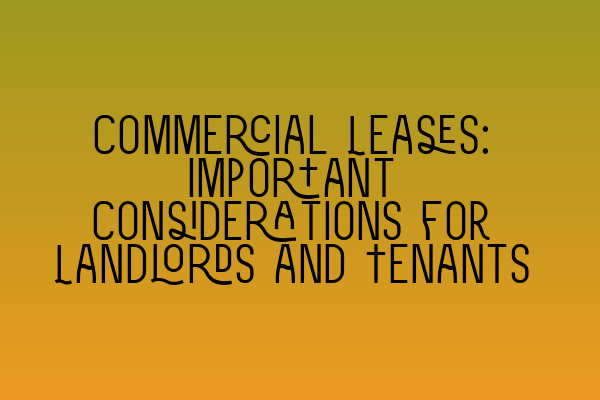Commercial Leases: Important Considerations for Landlords and Tenants
Welcome to our blog post on commercial leases, where we will discuss important considerations for both landlords and tenants. Whether you’re a property owner looking to lease out your commercial space or a business owner seeking a new location, understanding the key aspects of commercial leases is crucial. So, let’s dive right in!
1. Definitions and Parties Involved
The first step in any commercial lease agreement is clearly defining the terms and identifying the parties involved. Both the landlord and the tenant need to be clearly named, along with their respective contact details. It’s essential to ensure that the lease accurately reflects the identity of the parties and their legal rights and obligations.
2. Lease Duration and Renewal Options
The duration of the lease is a critical consideration for both landlords and tenants. Landlords typically prefer long-term leases for stability, while tenants may prefer shorter terms to maintain flexibility. Discussing and negotiating the lease duration upfront can help avoid future conflicts. Additionally, renewal options should be clearly outlined in the lease to allow for smooth continuation of the lease agreement if desired.
3. Rent and Payment Terms
Rent is a central component of any lease agreement. It’s important to clearly state the amount of rent, the frequency of payments, and any late payment consequences. Tenants should carefully review the rent escalation clause, if any, to understand potential increases over the lease term. For landlords, it’s important to set appropriate rental rates that align with market conditions and consider factors like operating expenses, property taxes, and maintenance costs.
4. Maintenance Responsibilities
Determining maintenance responsibilities is crucial to avoid disputes during the lease term. The lease should outline who is responsible for repairs, maintenance, and general upkeep of the property. Landlords typically hold structural maintenance responsibilities, while tenants may be responsible for internal repairs and keeping the premises clean.
5. Alterations and Improvements
Commercial tenants often have specific requirements for their business space. The lease should address whether the tenant has the right to make alterations or improvements to the premises and, if so, under what conditions. Likewise, landlords may require their consent and approval of any modifications that tenants wish to make. Clearly defining these terms is essential to avoiding misunderstandings and potential damage to the property.
6. Insurance and Liability
Both landlords and tenants need insurance to protect their interests. Landlords may require tenants to obtain general liability and property insurance, while tenants should consider taking out business interruption insurance. The lease should clearly outline the insurance obligations of both parties to ensure adequate coverage and indemnification in case of unforeseen events.
7. Termination Clauses and Default
No lease agreement is complete without provisions for termination and default. The lease should spell out the circumstances under which either party may terminate the agreement early, including proper notice periods. It should also outline what constitutes a default and the consequences for breaching the terms of the lease. Being aware of these provisions can help parties better understand their rights and obligations, fostering a fair and transparent leasing relationship.
Conclusion
Commercial leases are complex legal agreements that require careful consideration and negotiation. We hope this blog post has provided you with valuable insights into the important considerations for both landlords and tenants. By understanding these key aspects, you can better protect your interests and ensure a successful commercial leasing experience.
If you’re looking to test your knowledge of contract law, we invite you to check out our Interactive SQE Mock Tests for Contract Law: Test Your Knowledge. Additionally, our SQE Contract Law Webinars provide expert insights and guidance to help you navigate the intricacies of contract law. For a comprehensive analysis of recent changes in contract law and a detailed exploration of parties’ rights and responsibilities, consider reading our related articles.
Remember, a well-drafted commercial lease agreement sets the foundation for a positive and mutually beneficial landlord-tenant relationship. If you have any further questions or need expert advice regarding commercial leases, please don’t hesitate to contact us at SQE Property Law & Land Law. We’re here to help you achieve your property goals.
